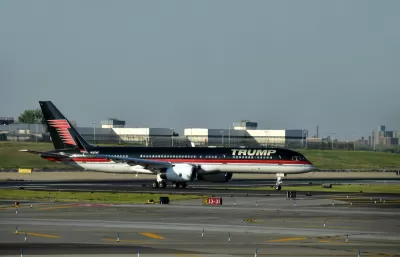During a closed-door meeting Wednesday with Democratic and Republican lawmakers, President Trump endorsed hiking the gas tax by 25-cents per gallon to help pay for the $200 billion investment and restore solvency to the Highway Trust Fund.

"President Donald Trump endorsed the idea of a 25 cent-per-gallon gas tax increase at a meeting Wednesday with lawmakers, people who attended the session said — a move that could help pay for his big infrastructure plan but brought swift attacks from anti-tax conservatives," report Lauren Gardner, Brianna Gurciullo, and Tanya Snyder for POLITICO on Feb. 14.
Sen. Tom Carper (D-Del.), one of several lawmakers of parties who attended the meeting, confirmed that Trump had indeed "offered his support for raising the gas and diesel tax by 25 cents a gallon and dedicating that money to improve our roads, highways, and bridges."
Carper added that Trump "came back to the idea of a 25 cent increase several times throughout the meeting," and that he "even offered to help provide the leadership necessary..."
A different opinion on the seriousness of the gas tax proposal was offered by Sen. James M. Inhofe (R-Okla.), and chairman of the Senate Environment and Public Works (EPW) Subcommittee on Transportation and Infrastructure, reports Eileen Houlihan for the American Road & Transportation Builders Association (ARTBA).
“Tom (Sen. Tom Carper (D-Del.) wants to say it his way. What the president said was that yes, everything is on the table. There was a lot of wishful thinking in those comments and that was an interpretation of everything being on the table,” Inhofe said Feb. 15 at a Washington Examiner event on infrastructure.
Indexing federal gas tax
Inhofe himself did make news by indicating his support for indexing the federal gas tax to inflation, added Houlihan. He also indicated that finding the $200 billion in the budget to pay Trump's infrastructure plan wouldn't be difficult, referencing the American Recovery and Reinvestment Act of 2009, and belying Trump's claim that his infrastructure plan is the “will spur the biggest and boldest infrastructure investment in American history.”
“If we came up with $836 billion for [President] Barack Obama, that $200 billion is not going to be a problem,” Inhofe said.
Would spare public transit and Amtrak from huge cuts in Trump's FY 2019 Budget proposal
Should new gas tax revenues rather than the general fund be the source of much of the $200 billion, recognizing that a gas tax couldn't fund infrastructure other than surface transportation investments, Amtrak and public transit would be spared massive cuts included in President Trump's Fiscal Year 2019 Budget proposal, as noted in a Feb. 13 Planetizen blog post, "Critics Blast Trump's Infrastructure Plan."
The administration plans to siphon resources from federal transit programs, which Trump singled out for cuts in his 2019 budget proposal [pdf], also released today. The budget calls for axing $3.7 billion for New Starts, the major source of federal funding for transit expansion projects.
All told, the Trump budget proposal would “cut more than $168 billion of Federal highway, transit, Amtrak, and water infrastructure funding over the next 10 years,” according to Representative Peter DeFazio, an Oregon Democrat and the ranking member of the House infrastructure committee.
Perilous politics
The last time the gas tax was raised was by Democratic President Bill Clinton in 1993 for the purpose of deficit reduction. Not a single Republican voted for the 4.3-cents per gallon increase, similar to the Affordable Care Act in 2010. Vice President Al Gore cast the deciding vote in the Senate. The next year, Democrats lost control of the House and Senate to Republicans in the midterm elections.
So it's understandable from a political perspective that the party in power wouldn't want to be tied to a gas tax increase, especially since Republicans have been touting their Tax Cuts and Jobs Act, passed without any Democratic votes in December. Last month, Republican leaders went on record in opposition to a possible 50-cents gas tax increase that Trump had been said to be considering.
"But Republicans also don't want to add any more to the debt," writes for The Washington Post's Wonkblog, also reporting on Wednesday's meeting.
Trump and the GOP-led Congress have passed a major tax cut and spending increase, putting the country on track to run $1 trillion deficits for years to come. There's not much appetite to go into debt even more in order to fund infrastructure.
Is this a U.S. Chamber of Commerce gas tax?
A 25-cent hike was first raised by the U.S. Chamber of Commerce last month as part of a four-point plan, which includes streamlining permitting and encouraging public-private partnerships, both also key parts of Trump's plan, to modernize America's infrastructure.
The U.S. Chamber says the proposal would raise $394 billion, more than enough to pay for Trump's $200 billion infrastructure plan and possibly even expand it further as many Democrats want. The increase could be phased in over the next five years by hiking the tax 5 cents each year.
According to an analysis [pdf] by San Francisco-based Energy Innovation, revenues would be lower: $301 billion over 10 years. In addition, a 25-cents tax would add "around 1.2 million additional [electric vehicles] EVs on the road by 2050 and reduce annual gasoline consumption "between 30 and 35 million barrels with the full $0.25 tax, saving more than a billion barrels through 2050."
Big Oil's reaction
Groups funded by the Koch brothers, no friend to EVs or public transit, have pounced on the idea. Americans for Prosperity were quick to claim it would hurt low-income Americans because gas taxes are regressive.
The oil industry's trade group, the American Petroleum Institute, signaled it wouldn't take a position on an increase in the gas tax, reported Dino Grandoni for The Washington Post's energy PowerPost on Feb. 5.
“That is an appropriate role for government” to set that tax, said Jack Gerard, the outgoing head of the American Petroleum Institute, adding that “as long as those dollars are dedicated for their stated purpose to build highways, et cetera.”
Sparing cuts to highway fund and setting it on a path toward sustainability
As Planetizen noted last month, Trump's infrastructure plan and budget "spell doom for the Highway Trust Fund." A gas tax increase would likely eliminate that threat and likely bolster the fund, which brings in about 68 cents from user taxes and fees for ever dollar it spends. The remainder comes from the general fund, a subsidy which Trump's budget threatens to end.
Additional reading:
-
"Gas Tax Hike Could Have Serious Consequences For Oil Markets"
By Tsvetana Paraskova - Feb 14, 2018. -
Republicans consider the unthinkable: A gas tax increase to pay for infrastructure
by Josh Siegel | Feb 12, 2018.
Hat tip to Mark Boshnack
FULL STORY: Trump endorses 25-cent gas tax hike, lawmakers say

Maui's Vacation Rental Debate Turns Ugly
Verbal attacks, misinformation campaigns and fistfights plague a high-stakes debate to convert thousands of vacation rentals into long-term housing.

Planetizen Federal Action Tracker
A weekly monitor of how Trump’s orders and actions are impacting planners and planning in America.

In Urban Planning, AI Prompting Could be the New Design Thinking
Creativity has long been key to great urban design. What if we see AI as our new creative partner?

The Vast Potential of the Right-of-Way
One writer argues that the space between two building faces is the most important element of the built environment.

Florida Seniors Face Rising Homelessness Risk
High housing costs are pushing more seniors, many of them on a fixed income, into homelessness.

Massachusetts Budget Helps Close MBTA Budget Gap
The budget signed by Gov. Maura Healey includes $470 million in MBTA funding for the next fiscal year.
Urban Design for Planners 1: Software Tools
This six-course series explores essential urban design concepts using open source software and equips planners with the tools they need to participate fully in the urban design process.
Planning for Universal Design
Learn the tools for implementing Universal Design in planning regulations.
Gallatin County Department of Planning & Community Development
Heyer Gruel & Associates PA
JM Goldson LLC
City of Camden Redevelopment Agency
City of Astoria
Transportation Research & Education Center (TREC) at Portland State University
Jefferson Parish Government
Camden Redevelopment Agency
City of Claremont




























